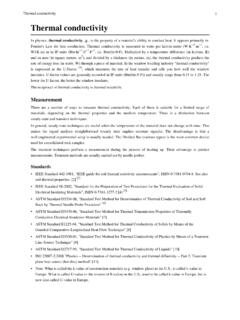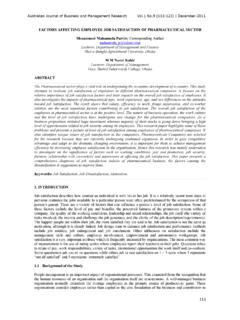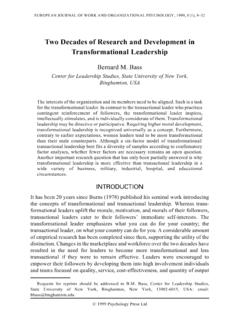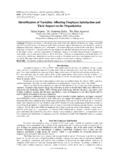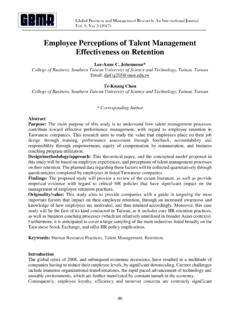Transcription of The Benefits of Empowering Employees
1 Saylor URL: # The Saylor Foundation Page 1 of 5 The Benefits of Empowering Employees Introduction In today s business age, organizations are looking for the extra edge to allow them to outperform their competitors and to gain market share. An important factor in direct correlation to an organization s performance is employee productivity. So, the next question most of us ask is How can I improve employee productivity? Many businesses in the modern world believe the philosophy that Empowering Employees will improve productivity and will provide other Benefits . This philosophy is based on the theory that as Employees are empowered to take control and make decisions, they feel more confident, capable, and determined to work more effectively and efficiently.
2 As a result of these business practices, Employees become more productive. A company that embraces employee empowerment and consistently outperforms their competitors is Toyota. Toyota believes that every employee should take ownership in the company by identifying quality defects and ways to improve efficiency. This philosophy has established the company as a quality champion to most automobile buyers. Toyota s dedication to employee empowerment and quality has allowed the company to become the world s third largest automobile manufacturer. In order to solidify your understanding of why companies choose to embrace employee empowerment , you must first realize the Benefits associated with employee empowerment .
3 Let us take a closer look at some of the positive impacts that Empowering Employees can have on an organization s quality of work, employee satisfaction , collaboration, productivity, and costs. Quality of Work Employees have a need to feel like they are participating in the well-being of the organization. They want to know that they are contributing to the organization s success and that they are making a difference in the world. In organizations that provide Employees with the freedom and flexibility to make a difference, Employees feel empowered to deliver high quality work. For instance, HCL Technologies empowerment philosophy has enabled the company to provide innovative, high quality service to their customers, resulting in revenues tripling and customer satisfaction increasing by 73% in the last 5 years.
4 Empowered Employees take personal pride in their work and responsibility for doing a good job. As a result, organizations reap the Benefits of empowered Employees by delivering high quality products and services. Saylor URL: # The Saylor Foundation Page 2 of 5 employee satisfaction Research often cites high levels of employee satisfaction as a major advantage to Empowering people in the workplace. In a 1999 research study conducted by the National Association of Working People, companies with high levels of employee satisfaction were examined to uncover the source of satisfaction .
5 The case study discovered that companies with high levels of employee satisfaction had a flexible, engaging work culture, which empowered Employees . In addition, Wagner & Harter (2006) reconfirmed this notion, citing empowered Employees with higher levels of satisfaction than organizations with more structured, hierarchical, and less flexible work environments. In these environments where Employees were empowered, Employees were granted the power to identify problems, provide solutions, and make important decisions. Increased responsibility, flexible work schedules, a fun work culture, and public recognition for success stories all contributed to the Employees sense of feeling empowered.
6 In return, Employees rated their satisfaction levels as high compared to other organizations with cultures that prohibited employee empowerment . According to Wagner & Harter (2006), increased levels of employee satisfaction lead to higher levels of loyalty, resulting in increased retention ratios. In addition, the quality of work produced by satisfied workers tends to be higher, reducing the number of product defects and poor service issues. Overall, these items contribute to increased productivity for the employee and the organization, resulting in an improved bottom-line for the company.
7 Collaboration As Employees are empowered and treated as vital components of the organization, they gain self-confidence in their abilities to positively influence the organization. Employees with healthy levels of self-confidence and self-esteem are more willing to share information with others. They feel comfortable exchanging ideas and collaborating with others in an honest and open manner. These behaviors promote teamwork and active involvement in support of company-wide goals that could not be achieved with a disjointed, non-connected workforce. As the famous saying from Helen Keller goes, Alone we can do so little; together we can do so much.
8 Collaboration often allows for an organization to achieve so much more than any one individual can achieve on his or her own. Saylor URL: # The Saylor Foundation Page 3 of 5 Productivity Employees who are granted the power to take charge at work feel an increased sense of responsibility, accountability, and ownership for their work. They work diligently to meet project deadlines and organizational goals. They feel energized to do what it takes to get the job done and to do it right. All of these reasons fuel an empowered employee to be more productive, providing better performance results for the organization.
9 For example, GE instituted a work-out program intended to empower Employees to identify and eliminate redundancy, waste, and bureaucracy that exist in big corporations like GE. Employees felt energized to meet the challenge and their creativity was unleashed as they restructured daily job functions and processes. As a result, employee productivity skyrocketed and transformed GE into one of the largest, most profitable companies in the world. Costs Reduction of costs is another advantage of Empowering Employees . Many factors contribute to this advantage. For instance, as employee satisfaction increases for empowered Employees , Employees sense of loyalty and dedication to their job and the organization also increases.
10 According to Wagner & Harter (2006), these actions result in longer-term Employees , less job transitioning, and improved retention rates, thus reducing employee turnover costs. Another cost reduction factor is the increased efficiency of operations due to more engaged and accountable Employees . As Employees become involved in day-to-day decisions and take a sense of pride in their work, they become aware of inefficiencies in routine functions that cost the company money. According to The Gallop Organization, organizations that enable Employees to be more empowered and engaged, experience 27% higher profits (Wagner & Harter, 2006).



